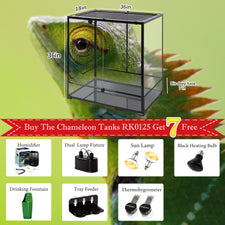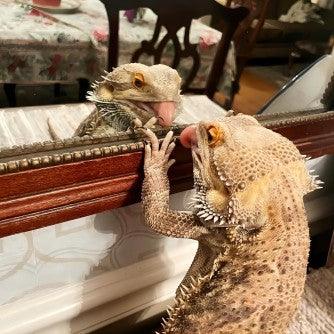Have you noticed bearded dragons becoming less active and eating less lately? Don't worry. It's not necessarily a sign of illness! It could be that your scaly friend is going through a natural process known as brumation.
Bearded dragons are fascinating creatures that make great pets. An interesting thing about these reptiles is that they undergo a period of dormancy called brumation. Brumation is normal, but it can be unsettling for first-time owners who may not know what to expect.
In this blog post, we will look closer at bearded dragon brumation and everything you should know, including the signs of brumation, how to prepare your dragon for brumation, and bearded dragon UVB light.
By the end of this post, you'll better understand what to expect when your dragon goes through brumation and how to care for them during this time.
What is it meant by Bearded Dragon Brumation?
Bearded dragons got their name from the spines that run along their jawline, which resemble a beard. These spines are used for defense and territorial displays. They are popular pets as they are easy to care for and can be friendly if handled regularly.
Bearded dragon brumation is simply a natural process. It means that changes occur in reptiles in response to temperature and daylight hours changes. It is identical to hibernation in mammals. During brumation, reptiles may sleep for long periods. Their metabolism may slow down. They may stop eating altogether. Bearded dragons usually start brumating in late fall or early winter when the days get shorter, and the temperatures drop.
Most dragons would come out of brumation on their own when the weather starts to warm up again in spring. However, some bearded dragons may need help from their owners to come out of brumation if they do not seem to be responding to the changing seasons on their own. If you think your dragon is starting to brumate, you can do quite a few things to help them.
Bearded Dragon Brumation Signs
Your dragon may show signs of brumation as the weather cools down. Here are some signs to look for;
- Changes in behavior: They may become more irritable or aggressive during brumation.
- Weight loss:Bearded dragons may lose weight during brumation, which is normal.
- Change in sleeping habits:Bearded dragons typically sleep more during brumation. They may also sleep longer during the day and be less active at night.
- Shedding:Some bearded dragons will shed their skin more frequently during brumation as their bodies prepare for cooler temperatures.
- Change in color:Your dragon's color may change during brumation as they try to camouflage itself against predators.
It's important to note that not all bearded dragons brumate, as some may only undergo a partial brumation. If you're unsure whether your dragon is going through brumation, it's always best to consult a good local veterinarian.
Is A Bearded Dragon Dead, Sick, or Brumating
When determining if your Dragon is dead, sick, or brumating, you can look for the following things. First, check for signs of life, such as heartbeat, breathing, and movement. If Bearded Dragon appears inactive and unresponsive, it may be in a state of brumation.
During brumation, Bearded Dragons often burrow themselves into their substrate and remain hidden for extended periods. They may also refuse food and water and have a decrease in appetite.
If it seems your dragon is brumating, it is best to leave them alone as they will eventually come out of it alone.
If you suspect that the Dragon is sick or deceased, it is always best to consult with a veterinarian to be sure.
Would my bearded dragon hibernate?
Most bearded dragons come from warm climates and don't have the instinct to hibernate. However, if a bearded dragon is exposed to cooler temperatures for an extended period, it may enter a state of brumation.
Brumation is similar to hibernation but not as extreme. During brumation, a bearded dragon may sleep longer and have a decreased appetite. It may also spend more time hiding and be less active overall.
While brumation is not harmful to a bearded dragon, monitoring its health during this time is important. Contact a vet immediately if you notice any major changes in your dragon's behavior or appearance.
Bearded Dragon Brumation
As the temperature outside begins to cool down, Bearded Dragon's metabolism will slow down. It is their natural way of preparing for winter when food is scarce, and the weather is harsh. Brumation starts, and your dragon may become less active, eat less often, and sleep more.
Brumation is not the same as hibernation, as your dragon will still be awake for part of the day and able to move around. But they will be much less active than usual. While it's normal for them to want to spend more time in their basking spot or hiding away, you should still make sure they're getting enough exercise and eating enough food.
Talk to your vet if you're concerned about your dragon's health during brumation. They can help you create a care plan to keep your dragon happy and healthy all winter.
How is Bearded Dragon UVB Light beneficial for Dragon Brumation?
Bearded dragons require UVB lighting to help them produce vitamin D3, essential for calcium absorption. Without sufficient vitamin D3, a bearded dragon can develop the metabolic bone disease, which can cause weak bones, deformities, and other health problems.
During brumation, a type of hibernation that bearded dragons experience during winter, they may reduce their activity levels and stop eating. However, they still require UVB lighting to maintain their health and well-being.
UVB lighting can help stimulate a bearded dragon's appetite, which is important during brumation when they may not feel like eating. It can also help prevent metabolic bone disease, a risk during periods of reduced activity when they may not be getting sufficient calcium from their diet.
UVB lighting is essential for bearded dragons, including during brumation, as it helps them maintain their health and well-being.
Conclusion
Brumation is an essential part of the bearded dragon's life cycle, and understanding it can help you to provide them with a healthy and happy environment. If a bearded dragon has food, water, shelter, and heat, then brumation may not be a problem.
Make sure you always keep an eye on your pet during this period so that you can catch any potential problems early on.
With these tips in mind, your dragon should have no trouble slipping into its natural brumation cycle without issue.











